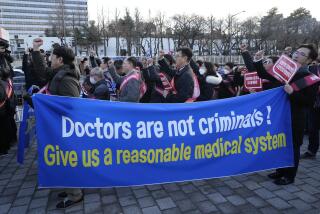Sleep loss a merit badge for doctors
- Share via
Even with sleep increasingly recognized as an important determinant of health, some doctors may resist the evidence. From working round-the-clock shifts during residency to on-call nights to early-morning rounds, they’re sleep-deprived -- and proud of it.
“Organized medicine and the professional medical societies are sanctioning 100,000 people a year to working 30-hour shifts twice a week during their medical education,” says Dr. Charles Czeisler, director of the division of sleep medicine at Harvard Medical School.
“That gives you some sense of where we’re at with this,” he says. “Physicians are being taught in training that this is OK. We have this attitude of machismo in relation to sleep loss.”
Doctors should care more about sleep -- for their own sake as well as their patients, says Eve Van Cauter, a professor of medicine at the University of Chicago. “The medical school curriculum involves very little education to future physicians about sleep,” she says. “But it could be that if sleep is overlooked, other problems could be too.”
The medical profession has become more sensitive to the exhaustion of young interns. In 2003, residents’ work hours were limited by the Accreditation Council for Graduate Medical Education to 80 hours per week in the hopes of reducing doctor errors. But some studies suggest the policy has had little effect. Beginning in August, residents in Europe will be limited to workweeks of no more than 48 hours.
“Maybe 80 hours is just too much. Maybe it should be 60 or 40 hours,” says Dr. John Wachtel, chairman of the American College of Obstetricians and Gynecologists’ Committee on Patient Safety and Quality Improvement and a clinical professor of obstetrics and gynecology at Stanford University.
In recommendations released last month, the committee advised obstetricians and gynecologists to try to avoid working between 3 and 5 a.m. or caring for patients while fatigued.
But until science comes up with a quantitative method for measuring fatigue, Wachtel says, the medical profession may be reluctant to say just how much sleep is too little -- for them or their patients.





